- Home
- Lisa Gardner
Alone Page 6
Alone Read online
Page 6
“Will it work?” Bobby asked at last. “Guy's a judge. He's got money, he's got influence. Shit, I can't afford a real suit on what I make. Does that mean he wins?”
“I don't know,” Bruni said, but he sighed heavily, which meant he knew enough.
“I don't understand. Jimmy had a gun. Jimmy was pointing it at his wife and child. Doesn't that mean anything to anyone? To even his parents?”
“It's a little complicated.”
“Why, because he's rich, because he's got a house in Back Bay? Beating your family is beating your family. I don't care how much money you got!”
The lieutenant grew quiet.
“What?” Bobby demanded to know. “For God's sake, what?”
Bruni sighed heavily. “In the court papers, the Gagnons aren't denying that Jimmy had a gun. And they're not denying that he pointed it at his wife. But they're saying . . .
“They're saying the wife's the problem in that house, Bobby. According to the court papers, Catherine Gagnon's been abusing her son. And if Jimmy was threatening her, it was only because he was trying to save his son's life.”
N ATHAN HAD BEEN throwing up all day. He was finally asleep now, a pale, exhausted form that looked much too fragile against the pile of soft blue blankets. His eyelashes formed dark smudges against his cheeks. His sunken face appeared both too small and too old for a child who was only four.
When Maryanne and James had arrived first thing this morning, allegedly having bolted out of bed the minute they saw the news, but appearing strangely well groomed for a couple who had been wrenched from sleep by word of their son's death, they had eyed Nathan carefully.
Maryanne had been performing her favorite damsel-in-distress act, of course. All oversized blue eyes, pale face, and trembling hands.
“I simply can't bear it,” she'd said again and again in her overwhelming Southern lilt. Forty years of living in Boston, and the woman could still sound as if she'd stepped straight out of a Tennessee Williams play.
In between all the theatrics, however, Catherine could see both Maryanne and James making mental notes: Boy is thin, lethargic, and obviously stressed. Boy does not move toward his mother, but clings to his nanny. Boy has fresh bruise on forehead.
Twice Maryanne tried to pull Catherine aside for “a quick word.” Both times, Catherine held her ground. Prudence, the English nanny, was well trained and had been imported by Catherine for her dutiful nature and inherent sense of discretion. She was still new, however, so while Catherine had given her strict orders never to leave Nathan alone with his grandparents, she had no idea how the girl would hold up under pressure. James could be very charismatic when he chose. For all Catherine knew, he'd convince the girl to fetch him a cup of tea, and that quickly, the war would be lost.
Catherine couldn't afford that kind of risk. Not these days.
Maryanne and James had offered to let her and Nathan stay with them, of course. After the “terrible events” of the night before, surely they needed someplace to stay, somewhere far away from this “tragic scene.” For God's sake, Catherine, think of the boy. Surely, he doesn't look well.
Finally, James had lost his patience. The minute Prudence escorted Nathan from the room—most likely to throw up again—the judge had turned on Catherine in a terrible rage.
“Don't think you're going to get away with this. Jimmy told us what was going on. Do you think you won last night? Do you think killing Jimmy solved your problems? Because I'm telling you now, they're just getting started.”
And for a moment, Catherine had honestly panicked. She thought wildly of Jimmy's new security system, installed six months earlier. The power light had gone off. She swore she saw the power light off. Then she realized that the silence had dragged on too long, that James was still regarding her with that cold accusing stare, so she drew herself up to her full height and said as regally as she could, “I don't know what you're talking about, James. Now if you'll excuse me, I have to plan a funeral for my husband.”
She'd swept out of the room, heart pounding, hands trembling, and a few minutes later, heard her in-laws storm out the door. Then the house was quiet again, except for the sound of Nathan dry-heaving down the hall.
Nathan hadn't cried. Not last night, not today. He probably wouldn't. In that way, he was Catherine's son. He faced everything—the doctors' appointments, the endless needles, the horribly invasive tests—dry eyed and solemn browed. The nurses loved him, but even when they touched him, he flinched.
He would have nightmares tonight. Horrible dreams where he would thrash wildly, then wake up screaming of pain and needles and demanding that the doctors leave him alone. Sometimes, more rarely, he cried out against the darkness, complaining of suffocating and needing every light to be turned on in the house. It both fascinated Catherine and frightened her that her personal nightmare had become her son's own.
Prudence would tend to him. As had Beatrice before her, and Margaret, Sonya, Chloë, and Abigail before that. So many faces, Catherine barely recalled them all. Of course she remembered Abby, who had been the first. Jimmy had hired her when Nathan was only one week old. Catherine hadn't wanted a nanny. Catherine had thought she'd care for her son herself, even nurse. But a week later, she roamed the house in a sleepless daze, the baby continuously vomiting on her milk-stained breast. She couldn't sleep, she couldn't eat. She compulsively turned on lights.
She held this creature, so small and helpless he mewed more than he cried, and she was overwhelmed by his sheer vulnerability, by all the things that could go wrong. Babies died. They starved, they were beaten, they died of the flu. They fell out windows, they died of SIDS. They were snatched out of cars, they were lured away from playgrounds, they were abused by priests. And there were fates worse than that. She knew of those, too. How some adults were actually excited by the cries of small children. How even a baby, a weak, helpless baby, could fall into the wrong hands and through no fault of its own, become a predator's toy.
How many babies were crying of hunger right now and being beaten for their trouble? How many babies were looking up hopefully into the eyes of their caretakers and receiving a smack to the side of the head? How many infants were born each day, innocent, boundless, sweet, only to be ruined by the very people who had given them life?
She wasn't going to be able to handle this. The world was too evil and Nathan too small. He would need her and she would fail him and that would destroy her once and for all.
She couldn't bear to hold him, but she couldn't stand to put him down. She couldn't bear to love him, but she couldn't stand to be apart. She was disintegrating into a million and a half tiny little shards, a sleep-deprived new mother, roaming the halls with her newborn son and quietly falling apart.
On the seventh day, Jimmy appeared with a young girl in tow. He explained it to Catherine gently, speaking slowly and using small words, which was about all she could understand. Abby would take Nathan now. Abby would feed him. Abby would tend to him. Catherine should go to bed. Jimmy had a glass of juice for her. And two pills. All she had to do was swallow and things would be better.
So that's how it happened the first time. Catherine traded her baby for a dose of Valium. After that, it wasn't so hard to spend a few days at a spa, then a week in Paris, two weeks in Rome.
The first nanny arrived, and Catherine had been visiting her child ever since.
Abby had done well by Nathan. Gotten him on a soy-based formula that briefly settled his finicky stomach. She read him his first story, earned his first smile, watched him take his first step. In the evenings, Catherine would hear them down the hall, Abby reading Goodnight Moon in her soft lilting voice, Nathan making small, snuggly murmurs as he curled up against her chest.
At Nathan's first birthday party, he'd fallen down. When Catherine tried to scoop him up, he'd screamed harder and, in front of all the parents, demanded his nanny. Then he'd flung his arms around Abby's shoulders and buried his face against her neck.
C
atherine fired the woman the very next day. And Nathan had cried for a month.
After Abby had come Chloë, another one of Jimmy's choices. She was a petite, generously curved Frenchwoman, and Catherine hadn't even been surprised to come home and find her and Jimmy in bed. What did you expect when your husband brought home a “nanny” who by her own admission had never changed a diaper?
Catherine took over the hiring after that. She stuck to older women, true professionals who knew the ropes and could maintain a certain distance from their young charge. They were too mature to appeal to Jimmy, too respectful to comment on how much time Catherine spent away from her son, and too self-righteous to ever know of the nights Catherine stood in Nathan's room, watching her frail son sleep and feeling her heart beat wildly in her chest.
Nathan had made it all the way to four years old now, and still sometimes in her mind's eye, Catherine would see a beat-up blue Chevy turning down their street: Hey, boy, I'm looking for a lost dog.
Of course, Nathan didn't need a stranger to haunt his dreams. The danger for Nathan had come from right between these four walls.
Two a.m. She should go to sleep. She already knew she wouldn't. The press remained parked outside, impatient vultures still digging for dirt. From time to time, squad cars passed as well. Checking the scene, monitoring the press, staring up at the fourth floor.
She had given her first statement to the police within hours of Jimmy's death. She'd been proud of herself, cool, calm, and collected. My husband has a temper. He drinks, he gets angry; this time, he found a gun. What had we fought about? Does it matter? Does anything justify a man aiming a gun at his wife? Yes, I was afraid. In all honesty, Detective, I thought I was dead.
They had wanted to talk to Nathan as well. She'd put them off. My son is too tired, too traumatized, too sick. It had bought her some time. For now.
The investigators had spent most of last night and this morning in the master bedroom. Now the room was cordoned off with yellow crime-scene tape. Parts of the carpet had been removed. Shattered glass gathered. Bedding whisked away. Plastic sheeting covered the hole where the sliding glass door used to be. The cold wind sliced effortlessly through the plastic, however, and carried a host of smells to the rest of the house.
Blood. Urine. Gunpowder. Death.
Her neighbors probably thought she was crazy to stay. The press and police, too. Maybe she was traumatizing Nathan. Or maybe she was insane. Truth of the matter was, where else did they have to go? Her father didn't know how to handle these kinds of situations; arriving at her in-laws would be akin to stepping into the lion's den.
Or maybe there was something more sinister at work. Maybe she just wasn't ready to leave. This house, this room, it was all of Jimmy she had left. And though no one would believe her, least of all her in-laws, in her own way, she had loved Jimmy. She had hoped, she had prayed with what little faith she had, that it would not come to this.
Now she ducked under the crime-scene tape. Now she entered the master bedroom, a chill, ghostly chamber of black and white. Gauzy curtains stirred, while the plastic over the shattered slider heaved and sighed. The smells were richer here. A pungent rusty odor that made her nose recoil even as it triggered memory.
She crossed to the bed, running her hand over the bare mattress and staring at the darker splatters of blood. She lay down in the middle of the vast empty space.
Jimmy seeing her for the first time and flashing that crooked grin in the middle of the crowded department store. “Hey, perfume lady. What's a guy gotta do to get a little spritz?”
Jimmy making love to her, then, afterwards, realizing that she hadn't felt a thing and trying to be kind about it. “Hey, honey, you know what? We'll just have to practice more.”
Jimmy fumbling the ring as he got down on one knee to propose. Jimmy staggering wildly as he carried her over the threshold. Jimmy promising her nine, ten children. Jimmy deliriously happy when she became pregnant with their first. Jimmy showering her with diamonds and pearls. Jimmy taking her on whirlwind shopping blitzes where he bought out half the city.
Jimmy sleeping with the maid, the nanny, her friends. Jimmy heading to the bar the first time she had to rush Nathan to the emergency room. Jimmy putting his fist through the wall when she dared to say he should drink less. Jimmy slamming his fist into her ribs when she dared to say something might be wrong with Nathan.
Then, six months ago, Jimmy coming upon the cache of letters written to her from her lover. He'd entered their bedroom at four a.m. He'd flipped her onto her stomach. He'd pinned her to the mattress, and then he'd sodomized her.
“Maybe I should've tried that in the very beginning,” he'd said when he was done. “Maybe you would've felt something then.”
Hours later, they'd sat across from one another at the breakfast table and made small talk about the weather.
Catherine curled up on the bare mattress now. She put her hand on the empty spot where her husband used to lie. And she remembered the last look on his face, during that instant right when the bullet found the tender spot behind his ear and right before it came shattering out the hard bone at his temple—an expression that was not handsome, not dashing, not charming, but totally, utterly betrayed.
And she wondered now, what had disappointed him most—his own imminent death, or the fact that he hadn't been able to kill her first?
A crash sounded from Nathan's room. Prudence started calling her name and Catherine scrambled down the hall, as surprised as anyone by the tearstains on her face.
A T THE HOSPITAL. Orders hastily shouted and promptly obeyed. One sharp needle and a nurse had drawn blood. Another sharp poke and the IV was in place. A third probing stab and Nathan had been catheterized.
Nathan's twenty-six-pound frame writhed in the middle of the hospital bed, jerking continuously as he fought to sit. His cheeks were on fire, sweat rolling down his limbs. His abdomen protruded painfully while his chest appeared concave as he gasped and heaved for breath.
A resident was reporting, “Severe epigastric pain—”
A nurse was shouting: “Temp one-oh-two. Heart rate one fifty, BP one fifteen over forty—”
Dr. Rocco was already barking out commands: “I need two milligrams morphine, cold compresses, TPN nutrition. Come on, people, move!”
The first time Catherine had been through this drill, she had trembled uncontrollably. Now, she was grim-faced as a combat veteran as two people pinned Nathan's writhing body to the bed and two others sliced off Nathan's cowboy-print pajamas and slapped on wires for the heart monitor. Nathan screamed in pain; they held him harder.
So it went, on and on and on, Nathan fighting for his life and the hospital staff fighting with him.
Afterwards, when the worst had passed, when the nurses and residents had moved on to more pressing cases, when only Nathan remained, unconscious, breathing strained, a tiny form lost in the middle of the metal-framed hospital bed, Dr. Rocco took her aside.
“Catherine . . . I know things must be difficult at home right now.”
“You think?” The words came out too harshly. Catherine regretted her tone almost immediately. She turned her head away from Dr. Rocco and stared at the walls, which were really much too white. She could hear the beep of Nathan's monitor, faithfully counting out the rhythm of his heart. Sometimes, she heard that sound in her sleep.
“Jimmy, we have to do something about Nathan.”
“Jesus, Catherine, can't you leave the poor boy alone?”
“Jimmy, look at him. He's sick. Really, really sick . . .”
“Is he? None of these fancy tests you order ever prove anything. Maybe the problem isn't with Nathan, Cat. I'm beginning to wonder—maybe the problem's with you.”
“Catherine, he has pancreatitis again. That's the third time this year. Given his heart and the rest of his health, he can't keep battling these kinds of infections. His liver is enlarged, he's still showing signs of malnutrition, and worse, he's lost a pound since I saw hi
m last. Have you been following the special diet we discussed? Lots of small meals, only soy products?”
“It's hard to get him to eat.”
“What about favorite foods?”
“He likes the soy yogurt, but even then, after a bite or two, he's done.”
“He's got to eat.”
“I know.”
“He must take his vitamins.”
“We're trying.”
“Catherine, four-year-olds don't get anorexia. Four-year-olds don't starve themselves to death.”
“I know,” she whispered helplessly. “I know.” And then, more tentatively, “Isn't there anything else you can do?”
“Catherine . . .” The doctor sighed. Now he stared at the walls, too. “I'm recommending you to Dr. Iorfino,” he said abruptly.
“You're sending me to another doctor?”
“He can see you on Monday. Three p.m.”
“But another doctor will mean more tests.” She was flabbergasted. “Nathan is tired of tests.”
“I know.”
“Tony . . .” The word came out as a plea. She was sorry the instant she said it.
Dr. Rocco finally looked at her. “The head of Pediatrics has formally asked me to remove myself from this case. I'm sorry, Catherine, but my hands are tied.”
And then finally, Catherine got it. James. Her father-in-law had gotten to him, or had intervened with the higher-ups in the hospital, or maybe both. It didn't matter anymore. As a doctor for Nathan, as an ally for her, Tony Rocco was done.
She rose steadily, careful to keep her chin up and her back straight. As gracefully as she could, she held out her hand. “Thank you for your assistance, Doctor,” she murmured.
For one moment, he hesitated. “I'm sorry, Cat,” he said softly. “Dr. Iorfino, he's a good doctor.”
“Older? Balding? Fat?” she asked bitterly.
“A good doctor,” Tony repeated.
She just shook her head. “I'm sorry, too.”

 Find Her
Find Her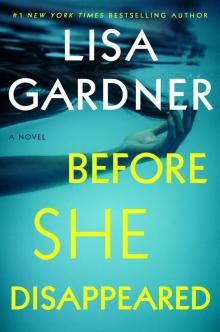 Before She Disappeared
Before She Disappeared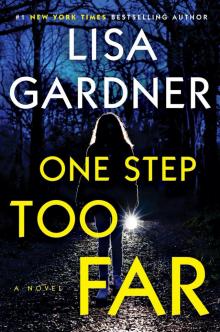 One Step Too Far
One Step Too Far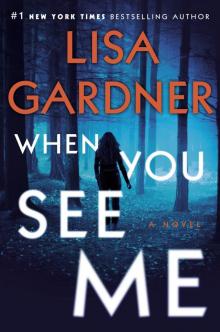 When You See Me
When You See Me Never Tell
Never Tell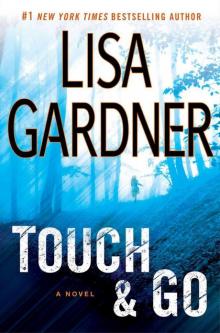 Touch & Go
Touch & Go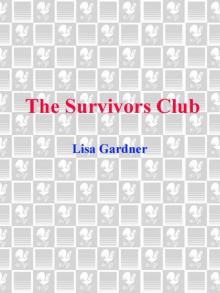 The Survivors Club
The Survivors Club MacNamara's Woman
MacNamara's Woman Love You More: A Novel
Love You More: A Novel Gone
Gone The Perfect Husband
The Perfect Husband Maggie's Man: A Family Secrets
Maggie's Man: A Family Secrets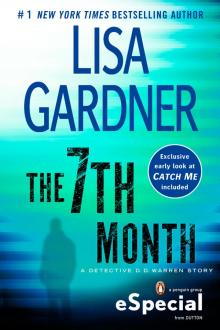 The 7th Month
The 7th Month The Neighbor
The Neighbor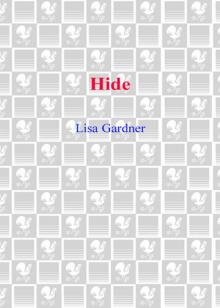 Hide
Hide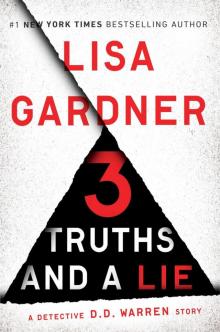 3 Truths and a Lie
3 Truths and a Lie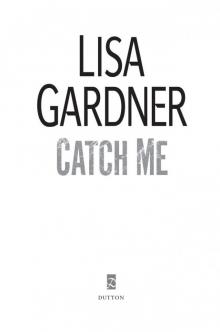 Catch Me
Catch Me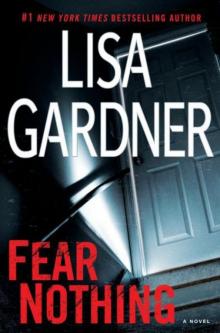 Fear Nothing: A Detective
Fear Nothing: A Detective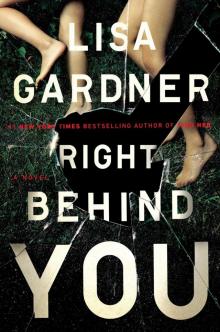 Right Behind You
Right Behind You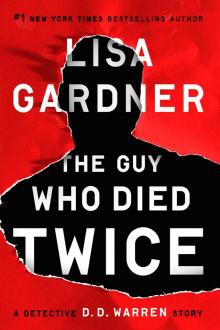 The Guy Who Died Twice
The Guy Who Died Twice Live to Tell: A Detective D.D. Warren Novel
Live to Tell: A Detective D.D. Warren Novel Live to Tell
Live to Tell Maggie's Man: A Family Secrets Novel
Maggie's Man: A Family Secrets Novel The Other Daughter
The Other Daughter Alone
Alone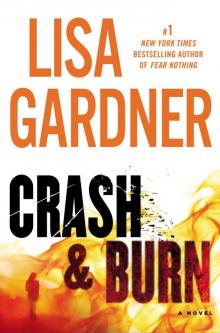 Crash & Burn
Crash & Burn The Detective D. D. Warren Series 5-Book Bundle
The Detective D. D. Warren Series 5-Book Bundle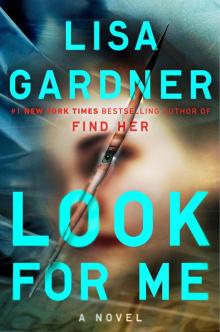 Look for Me
Look for Me Love You More
Love You More The FBI Profiler Series 6-Book Bundle
The FBI Profiler Series 6-Book Bundle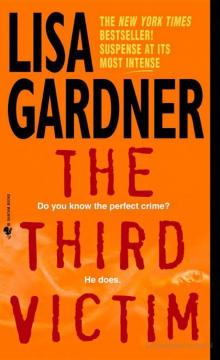 The Third Victim (Quincy / Rainie)
The Third Victim (Quincy / Rainie) Say Goodbye
Say Goodbye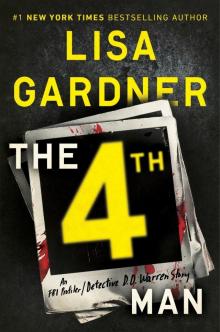 The 4th Man
The 4th Man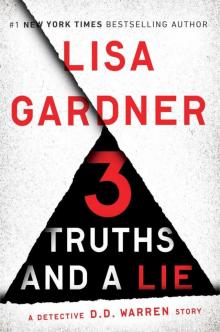 3 Truths and a Lie: A Detective D. D. Warren Story (Kindle Single)
3 Truths and a Lie: A Detective D. D. Warren Story (Kindle Single) Brandon's Bride
Brandon's Bride